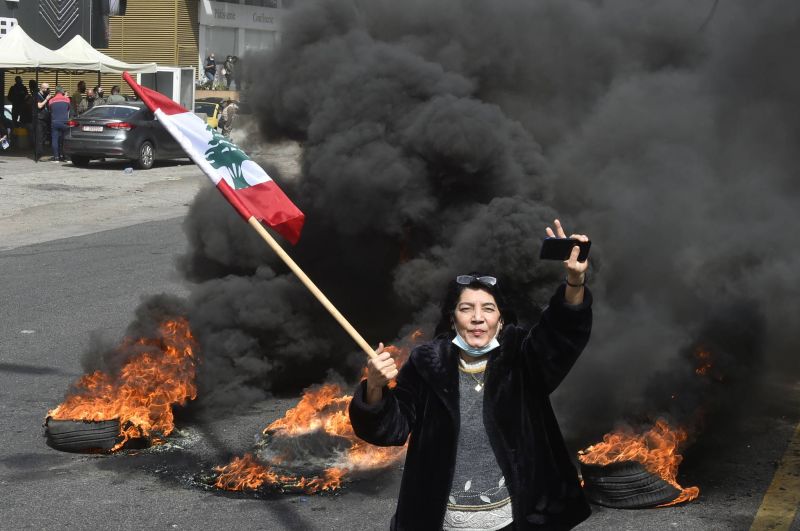
Protesters blocked roads across the country Tuesday. (Credit: Hussam Shbaro)
BEIRUT — Sporadic roadblocks across Lebanon entered their second week Tuesday as the local currency continued its downward spiral in the midst of a monthslong political deadlock.
For the eighth day running, angry protesters blocked major roads leading to the capital, causing traffic jams in and around Beirut, despite a partial COVID-19 lockdown.
The highways at Jal al-Dib and Khaldeh, as well as a number of roads in Zahle and other parts of the Bekaa, have been repeatedly blocked and reopened. The highway at the Dora roundabout, a transit hub, was also cut off.
The closures prompted Firass Abiad, the general manager of Rafik Hariri University Hospital, to sound the alarm, warning that his hospital and others are running “dangerously low” on oxygen needed to treat COVID-19 patients.
“Suppliers have not been able to deliver the much-needed gas due to roadblocks. Without timely oxygen delivery, lives will be lost,” he tweeted.
Lebanon is in the midst of battling a major outbreak of coronavirus following authorities’ decision to reopen the country for the Christmas holidays. While new infections have decreased somewhat, more than four out of every five intensive care beds are still full.
In downtown Beirut, a dozen protesters attempted to block a road next to the Mohammad al-Amin Mosque in Martyrs’ Square, burning tires and whatever items they could get their hands on.
“I have no job, nothing and this is why I’m protesting,” Ali Obeid, a 23-year-old Lebanese man, told L’Orient Today, calling on others to take to the streets.
“It’s only a matter of time before everyone is on the ground. When hunger hits, they’ll all be with us,” he said.
The almost round-the-clock protests come as the lira slumps to historically low levels, trading at around LL10,500 to the dollar on Tuesday. The lira reached its all-time lowest valuation on Saturday, trading at LL10,800 against the dollar.
The lira has lost some 85 percent of its value since the long-standing dollar peg faltered in 2018, causing the price of consumer goods to skyrocket. Food and non-alcoholic beverages prices had increased by some 402 percent as of December 2020, while household items and maintenance rose by 655 percent over the same period.
Despite the grim situation, 33-year-old Hiba, another demonstrator taking part in the protests in downtown Beirut, expressed optimism moving forward.
“I have a lot of hope because in the end what is right will prevail,” she told L’Orient Today, asserting that she doesn’t belong to any political party.
“They must all fall before we can rebuild Lebanon,” she said.
In October, former Prime Minister Saad Hariri was nominated to head what would be his fourth government, which he vowed would be tasked with a strict “six-month mission” to help Lebanon out of its crisis.
Almost five months later, he and President Michel Aoun have yet to come to terms on the shape and size of the government, trading numerous barbs along the way.
On Monday, Aoun condemned protesters’ roadblocks, calling them an “attack on citizens’ right to travel” and asking security forces to “implement the laws without hesitation.”
His comments followed an economic and financial security meeting with caretaker cabinet ministers and other officials. Following the meeting, officials vowed to crack down on illegal exchange operations and exchange rate platforms, calling on ministries and security agencies to “work to control the use of foreign currency except for commercial, industrial or health sector purposes.”
Additional reporting by Ghada Alsharif.